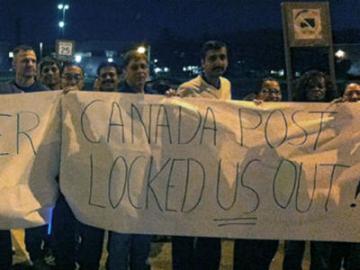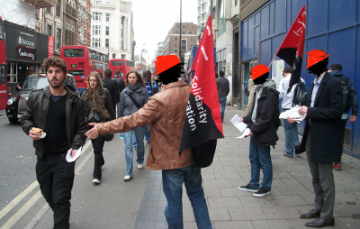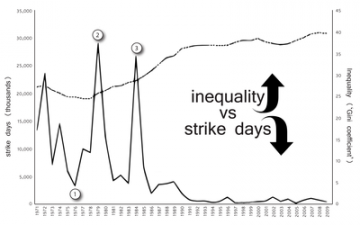Southern Cross: profiteers don't care
Have others been following the results of the near-bankruptcy of this major player in the private sector ‘for profit’ care homes business in Britain? In addition to major changes of ownership and some home closures causing disruption to the residents, the Guardian 17 June reported on the company’s current proposals to slash the already poor working wages and conditions of it’s staff on top of cutting some 3,000 jobs.
My friend who works in one of their homes has indicated that even prior to this, non-filling of vacancies and ‘requests’ for more flexible working were common, but this seems to be a whole new level of attack. The GMB union is supposed to be ‘negotiating’ with the company but I don’t think the full impact of all this has got across to all the workers involved, or those in other or no unions, as far as I can tell.
Also a ‘Quality Care Commission’ report just recently claimed about 25% or more of the homes were failing the minimum standards required. On top of that another similar report indicated many severe failings in ‘home support’ for the elderly and there are severe cut backs in local authority funding for home help.
Before my mother died a few years back she received mostly excellant, if time limited, home care from some dedicated, but poorly paid staff whose employer had recently been outsourced from the local authroity to a non-profit trust, but since then reports have indicated further deterioriation of staff and ‘client’ conditions. It still needed me to provide daily care in addition - which not everyone can give.
Conditions for the poor and elderly in this country are getting even worse but it is difficult for these workers to organise or strike and for the residents and others receiving help to be active in opposition to all this. If others in the ‘care industry’ or anyone receiving or trying to receive this kind of assistance can add more information or ideas that would be helpful.
Mike, Manchester
I write about the 70,000 people directly affected by the financial situation of the country’s largest care home operator. Southern Cross, which employs 42,500 staff to care for 31,000 vulnerable adults, has proposed plans to save £20 million in labour costs by making 3,000 redundancies and changes to terms and conditions. These include, but are not limited to, opting out of the European Working Time Directive, reductions in pay, an increase in hours and temporary lay-offs when there isn’t ‘enough work’.
It also seems likely that many of Southern Cross’ landlords will take over the running of the homes they own, meaning a further change in management, terms and conditions for staff. The GMB union, which represents 25% of Southern Cross workers, is in negotiations with the company but for what? Nicer pay cuts? This is what happens when we leave our most vulnerable people in the hands of profiteers.
Laura, Bristol
Beating rape culture is up to all of us
In the news recently, there have been a few articles about a cop and various politicians downplaying the seriousness of rape. These unfortunately aren’t only the words of a few ‘out of touch’ old sexist men, they reflect a wider culture that blames women being ‘provocative’ for rape, and excuses rapist men on the grounds that they have uncontrollable sexual drives.
This inspired a series of quickly organised – mainly over the internet – massive protests, starting in Canada and the United States, called ‘SlutWalk’. However, SlutWalk seems to consciously object to looking at sexism as a fundamental part of our society. They do not see themselves as part of a wider feminist tradition, and they ignore the context in which blaming women for being raped is taking place, and consequently they don’t see it as a social issue or a gender issue, but one of individual, personal choice.
The idea that women are to blame for rape is disgusting and should be challenged wherever it is found, by men as well as women. It is not a standalone issue, it is a symptom of a society engrained with sexism, on economic and cultural levels, as well as in our personal relations with each other. The occasional nod to gender equality is not enough; parliament isn’t going to hand out equality, even if it could – it’s up to us.
Jon, Oxford
A message for you Vinnie!
Dear Dr Cable,
We noted with interest and contempt your warning to trade unionists that a rise in industrial militancy in the UK will result in a hostile response from the State.
Our message to you is simple: BRING IT ON! The day the working class is intimidated by mediocre ruling-class lickspittles like you is the day ‘Hell’ freezes over.
Unkind regards,
Liverpool SF
Obama’s secret Yemen war
Dear Catalyst,
For any reader who thinks that Obama is any better than any other torturing, murdering capitalist president, both The Wall Street Journal and The Washington Post report that the Obama administration is planning to exploit the disorder from the civil war in Yemen by dramatically escalating a CIA-led drone bombing campaign.
In a sense this is nothing new as the US has been bombing Yemen for the last two years, including one attack using cluster bombs that killed dozens of civilians. But what’s new is that this will be a CIA drone attack program that is a massive escalation over prior bombing campaigns.
All this under the leadership of the man who won the Nobel Peace Prize in 2009!
Gladys, Bognor Regis
We’re all ‘extremists’ now
Dear Catalyst,
I’d like to bring it to your attention that the Metropolitan Police have branded your North London Local an “extremist organisation”. Also on the list were student campaigns, socialist groups and even the Bootle Labour Party!
The Met made this claim in response to a Freedom of Information request about possible police involvement in the synchronised take-down of around 50 activist, anarchist and socialist Facebook pages on the eve of the Royal Wedding.
They refused to confirm or deny involvement on the grounds that it related to “operational policing of extremist organisations”. If this is how the police view political activity, it’s hardly comforting to learn that a quarter of the population will be on the new police national database, including millions of people with no criminal record at all. George Orwell turns in his grave.
Tim, Leeds
Catalyst: Thanks for spotting this! We have to say, very little surprises us from the Met these days, a police force which literally gets away with murder. And they recently charged Alfie Meadows, who needed life-saving bleeding on the brain after an unprovoked baton attack with violent disorder. The state belongs to the rich, and if you don’t like it you’re an ‘extremist’. See you on the streets!
Congrats on wildcats
Dear Catalyst,
The North London Solidarity Federation wishes to congratulate our fellow postal workers in Islington on their successful three hour wildcat strike last week.
Unfortunately, Royal Mail’s harassment of workers who refuse to cut corners is nothing new and, regrettably, keeps going on up and down the country on a daily basis. Unreasonable cuts to duties coupled lay-offs have created impossible workloads. Management’s response to this situation - a situation they created - is to bully their workforce. Everyday at Royal Mail centres around the country, management try to make us work through our breaks, begin work before our shifts start, and stay on late without compensation. When we refuse—when we do our job properly—we are threatened with dismissal.
Enough is enough! Wildcat strikes are our most effective weapon and both management and our so-called union leaders know this. It is time to step it up and Make Royal Mail unmanageble. The Islington posties have taken the first step. All that’s left is for the rest of us to get on board. Congratulations again fellow workers .
(by a NL Postie)
North London SF
Write to Catalyst at catalyst@solfed.org.uk - We try to publish a range of views, with responses where possible. Comment on articles or current events is welcome. Letters may be edited and names will be anonymised by default unless you specifically request otherwise.




